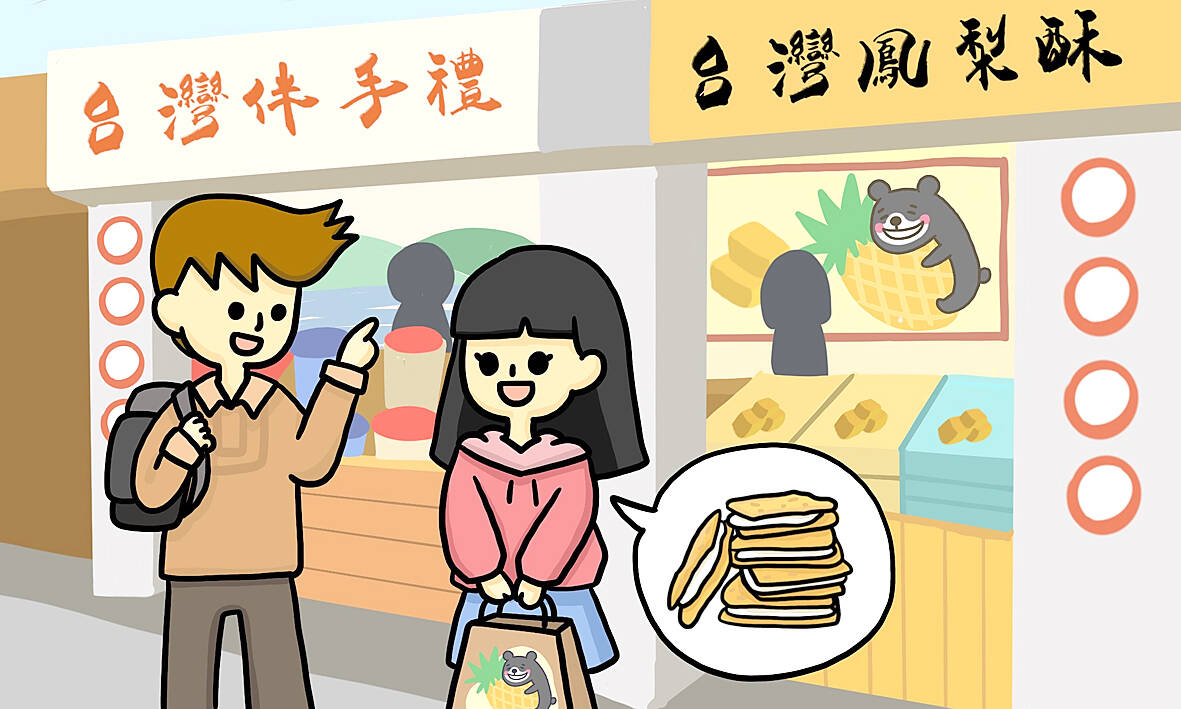對話 Dialogue
馬克:小實,臺灣有什麼特別的商品嗎?
Make: Xiǎoshí, Táiwān yǒu shénme tèbié de shāngpǐn ma?

小實:有啊!吃的、喝的、玩的都有,你要做什麼?
Xiaoshi: Yǒu a! Chī de, hē de, wán de dōu yǒu, nǐ yào zuò shénme?
馬克:我想買東西送給我的朋友,你覺得送什麼東西比較好?
Make: Wǒ xiǎng mǎi dōngxi sòng gěi wǒ de péngyǒu, nǐ juéde sòng shénme dōngxi bǐjiào hǎo?
小實:哦!很多人買臺灣的茶葉、鳳梨酥和牛軋餅乾送給外國的朋友。
Xiaoshi: O! Hěnduō rén mǎi Táiwān de cháyè, fènglí sū hàn niúgá bǐnggān sòng gěi wàiguó de péngyǒu.
馬克:牛軋餅乾?那是什麼?我只知道牛軋糖。
Make: Niúgá bǐnggān? Nà shì shénme? Wǒ zhǐ zhīdào niúgá táng.
小實:牛軋餅乾是把蘇打餅乾和牛軋糖放在一起,很好吃!
Xiaoshi: Niúgá bǐnggān shì bǎ sūdǎ bǐnggān hàn niúgá táng fàng zài yìqǐ, hěn hǎo chī!
馬克:我們可以試吃嗎?
Make: Wǒmen kěyǐ shì chī ma?
小實:可以啊!我帶你去商店看看。
Xiaoshi: Kěyǐ a! Wǒ dài nǐ qù shāngdiàn kànkan.
翻譯 Translation
Mark: Xiaoshi, are there any special products in Taiwan?
Xiaoshi: Sure! There are special products you can eat, drink and enjoy. Why do you ask?
Mark: I’d like to buy something for my friend. What do you think would be best to give them?
Xiaoshi: Oh! Many people buy Taiwanese tea, pineapple cakes and nougat biscuits for foreign friends.
Mark: Nougat biscuits? What’s that? I only know about nougat.
Xiaoshi: Nougat biscuits are a combination of soda biscuits and nougat. They’re delicious!
Mark: Can we try some?
Xiaoshi: Sure, I’ll take you to the store to try.
單字片語 Vocabulary
1. 特別 (tèbié) special
2. 茶葉 (cháyè) tea leaves
3. 餅乾 (bǐnggān) biscuit, cookies
4. 牛軋糖 (niúgá tang) Nougat
5. 試吃 (shì chī) to try, to taste
6. 商店 (shāngdiàn) shop, store
教材音檔 Audio Files
教材影片 Video Files:
https://www.instagram.com/celc.nou_tw/guide/_/17999106352646292/
實踐大學華語中心提供
By Shih Chien University Chinese Language Center: https://chineseusc.com/

A: In its latest annual travel guide, Bloomberg recommended two restaurants in Taipei: Golden Pig barbeque from South Korea and two-Michelin-star restaurant A. B: Also, tourists should definitely try Taiwanese cuisine while they’re here. Mountain & Sea House, Shin Yeh Taiwanese Cuisine, and Fujin Tree Taiwanese Cuisine & Champagne are good options. A: For local snacks, Fu Hang Soy Milk, Fu-Ba-Wang Pigs’ Knuckles Restaurant, and Wang Ji Rice Dumplings are all very popular. B: And the gold medalists of the 2025 Taipei International Beef Noodle Festival — Yun Shui Kitchen, The Howard Plaza Hotel Taipei, and Come N’ Eat

A: Bloomberg just released its annual travel guide, titled “25 Best Places to Travel in 2026.” What were the best Asian destinations? B: There were actually six Asian hotspots: Taiwan’s Taipei, Malaysia’s Penang, Kazakhstan’s Almaty, Indonesia’s Rote Island, India’s Tiger Reserves, and Oman. A: With its mix of traditional food and modern cuisine, Taipei has become a rising food capital in Asia. B: As Bloomberg reported, “Taiwan is a place that bubbles up in culinary conversation because of its famed beverage, bubble tea, and its early adoption of modern night markets.” A: And Din Tai Fung has now

Facing relentless flooding and rising expenses, Dumble Farm in England has stopped selling milk and started an unexpected but therapeutic venture: cow cuddles. In 2022, the owners sold most of their dairy cows and began letting visitors spend time brushing, petting, and even hugging specially trained Highland cows for 95 pounds per session. This unusual shift reflects the rise of the so-called healing economy, a sector where animal-assisted experiences are marketed as emotional remedies for stress and burnout. While dogs and cats remain the most common therapy animals, cows are gaining popularity for their calm nature. At Dumble Farm, only cows that

Owls have long fascinated people with their distinctive appearance and mysterious habits. These nocturnal birds possess large, round eyes and a flat facial disc. Their feathers come in shades of brown, gray, or white, helping them blend easily into the darkness. The most remarkable trait of owls is that they can turn their heads without damaging blood vessels. Contrary to popular belief, they can only rotate their heads up to 270 degrees, not 360 degrees. Owls have 14 cervical vertebrae, which is twice as many as humans. This special physical structure compensates for their inability to move their eyes within their